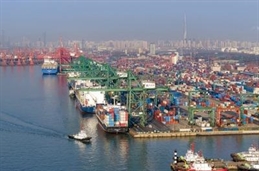
The United States (U.S.) appeared to have softened its stance on its planned port fees for vessels built in China and fleets that include Chinese-built vessels or have vessels on order from China calling at the country's maritime gateways.
U.S. Trade Representative (USTR) Jamieson Greer said at a recent Senate Finance Committee hearing that not all of the agency's proposed multimillion-dollar fees for Chinese-built ships docking at U.S. ports will be implemented, and the fees may not be cumulative.
Greer stated that the proposals are intended to address the shipbuilding shortage in the US. He added that the "proposed actions or series of potential revenue" could serve as incentives to bolster domestic shipbuilding, following a USTR investigation into China's increasing maritime dominance.
"They're proposed actions; they are a series of potential remedies that could be used to incentivise shipbuilding in the US. They’re not all going to be implemented. They’re not all going to be stacked," Greer told the lawmakers, according to Reuters.
Late in February, the USTR proposed a per-port-entry fee of up to US$1.5 million on Chinese-built vessels and up to US$1 million on any vessel (Chinese-built or non-Chinese-built) for operators that have any Chinese-built vessels in their fleet or order book.
The USTR has also proposed restricting the carriage of exports from the U.S. to a very small number of U.S.-flagged/U.S.-built vessels.
Since then, various shipping stakeholders have aired concerns against the proposal, warning of dire consequences to supply chains and the global economy once implemented.
The USTR is reviewing all the public comments it has received regarding the proposals, with Greer stating that the agency wants to "make sure that we have the right amount of time, the right incentives, to bring shipbuilding here without impacting our economy."
The administration will subsequently revise its port fee proposal based on the public feedback.
Reports suggest the revised plan could include delaying implementation and introducing new fee structures aimed at lowering costs for visiting vessels while reducing the impact on American businesses.
The planned port fees stem from the findings of a January USTR investigation that revealed that China's share of global shipbuilding tonnage surged from 5% in 1999 to over 50% by 2023, largely due to extensive state subsidies and preferential treatment for state-owned enterprises, which has pushed out private-sector and international competitors.
In contrast, the report noted a significant decline in shipbuilding activities within the U.S. since the 1970s. The USTR said that while American shipyards produced 70 vessels in 1975, they now only construct about five ships annually.



